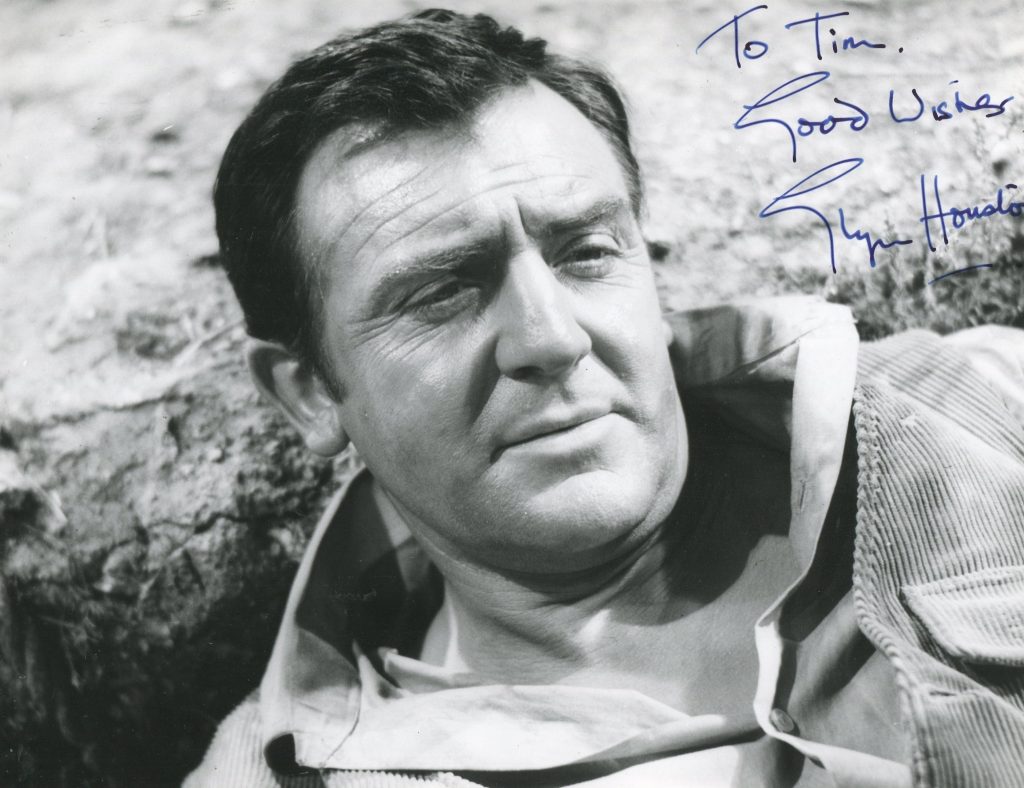
Glyn Houston obituary in “The Guardian” in 2019
Glyn Houston, who has died aged 93, was never quite as famous as his older brother, Donald, but he enjoyed a film career as a supporting actor, often playing sailors, soldiers or police officers, before television became a natural home to his acting skills.
He took the roles of the miners’ union leader Davy Morgan in the BBC’s 1960 serialisation of How Green Was My Valley and the news editor, Mike Grieves, throughout the newspaper drama Deadline Midnight (1961) before being seen intermittently as Detective Superintendent Arthur Jones in Softly Softly between 1966 and 1969.
Then came one of his best performances, as Bunter – Lord Peter Wimsey’s valet – in three serials adapted from Dorothy L Sayers stories starring Ian Carmichael as the aristocratic sleuth, Clouds of Witness (1972), The Nine Tailors (1974) and Five Red Herrings (1975).
“Mr Houston had everything right,” wrote a New York Times critic. “The lower-class look combined with upper-class hauteur, absorbed over the years from his master; an accent in limbo, not quite upstairs but not downright down; assurance of his own competence in his own station combined with deference to Wimsey’s more exalted place and special talents; and impeccable service in all contingencies, whether mixing the perfect cocktail, reciting railway timetables … or acting as a sounding board during trips in one of the master’s sports cars.”
Later Houston appeared in the sitcom Keep It in the Family (1980-83) as Duncan Thomas, the literary agent for a cartoonist, Dudley Rush (played by Robert Gillespie). He was at the top of the cast for Robert Pugh’s TV play Better Days (1988), in which he was Edgar, a widowed former miner leaving his community in the South Wales valleys to live with his son, a barrister. The modest star’s moving performance won him a best actor award at the 1989 Monte-Carlo television festival.
Houston was born in the valleys himself, in Tonypandy, Glamorgan, the second of three children of Elsie (nee Jones) and Alex Houston. His father was a Scottish professional footballer who finished his career at Mid Rhondda United after playing for Dundee United and Portsmouth.
When Mid Rhondda went bust in 1928 as South Wales was hit by recession and unemployment, Glyn’s parents moved to London to find work. They could not afford to take all the children, so Glyn was left behind to be raised by his maternal grandmother, Gwenllian. When his mother died three years later, all three children were reunited under Gwenllian’s care.
Glyn left Llwynypia elementary school in Tonypandy at the age of 14 to work on his grandmother’s milk round while Donald – two years his senior – started an acting career. Glyn briefly worked for the Bristol Aeroplane Company before serving in the second world war, from 1944, as an air gunner in the Fleet Air Arm and with the Royal Corps of Signals in Singapore, where he entertained the troops with shows as a stand-up comedian. He then toured India with a Combined Services Entertainment group that included Jimmy Perry, the future writer of Dad’s Army and It Ain’t Half Hot Mum.
On demob in 1947, Glyn harboured ambitions to continue performing comedy, but failed an audition at the Windmill theatre in London. Instead, Donald eventually helped him to get a job as an assistant stage manager with Guildford repertory company in 1949. The following year he made his film debut as a barrow boy in The Blue Lamp (1950), memorable for constantly being told by police to “move on”.
Supporting roles followed in several dozen movies during the 50s, as a sailor in Gift Horse (1952, alongside Trevor Howard), and in The Cruel Sea (1953, with Jack Hawkins), as Joan Collins’s boyfriend in Turn the Key Softly (1953), an army corporal in Private’s Progress (1956, with Carmichael), and a detective in Tiger Bay (1959, with John and Hayley Mills).
A talented footballer and rugby player at school, he was catapulted into a leading role as the star player in The Great Game (1952), a football drama, and enjoyed returning to comedy to act as a foil to Norman Wisdom in Follow a Star (1959), There Was a Crooked Man (1960), The Bulldog Breed (1960) and A Stitch in Time (1963). On radio Houston played two characters – Arthur Evans (1962) and Joe Higgins (1963-66) – in the soap opera The Dales.
Thereafter, apart from joining Donald in the 1980 wartime drama The Sea Wolves, his career was consumed by television roles. They included Bob Berris, Leslie Crowther’s darts partner, in the last two series (1972-73) of the sitcom My Good Woman, and Margaret Thatcher’s press secretary, Bernard Ingham, in Thatcher: The Final Days (1991).
He had made his West End stage debut in The Happy Family at the Duchess theatre in London in 1951, but turned down various Shakespearean roles, something that may well have restricted his career on the boards. “I always worried about learning the lines,” he said. “My one regret is that I didn’t become a leading classical actor. I think it’s what you have to do, like Anthony Hopkins. He never liked working in theatre, but he did all those Shakespeare roles.”
He won a Bafta Cymru lifetime achievement award in 2008. A year later his autobiography, A Black & White Actor, was published.
In 1956 he married the actor and model Shirley Lawrence. She died in 2016. He is survived by their two daughters, Leigh and Karen.
• Glyn (Glyndwr Desmond) Houston, actor, born 23 October 1925; died 30 June 2019


